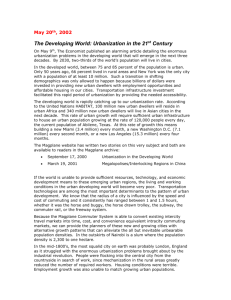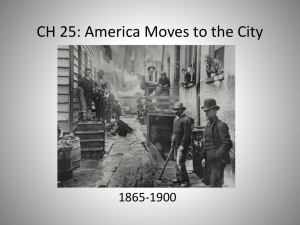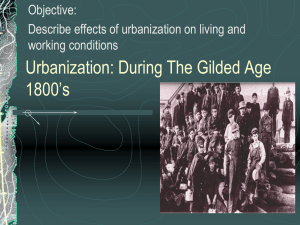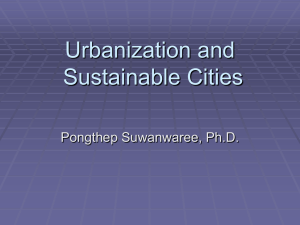2008 UN Forum Preamble - Consortium for Sustainable Urbanization
advertisement
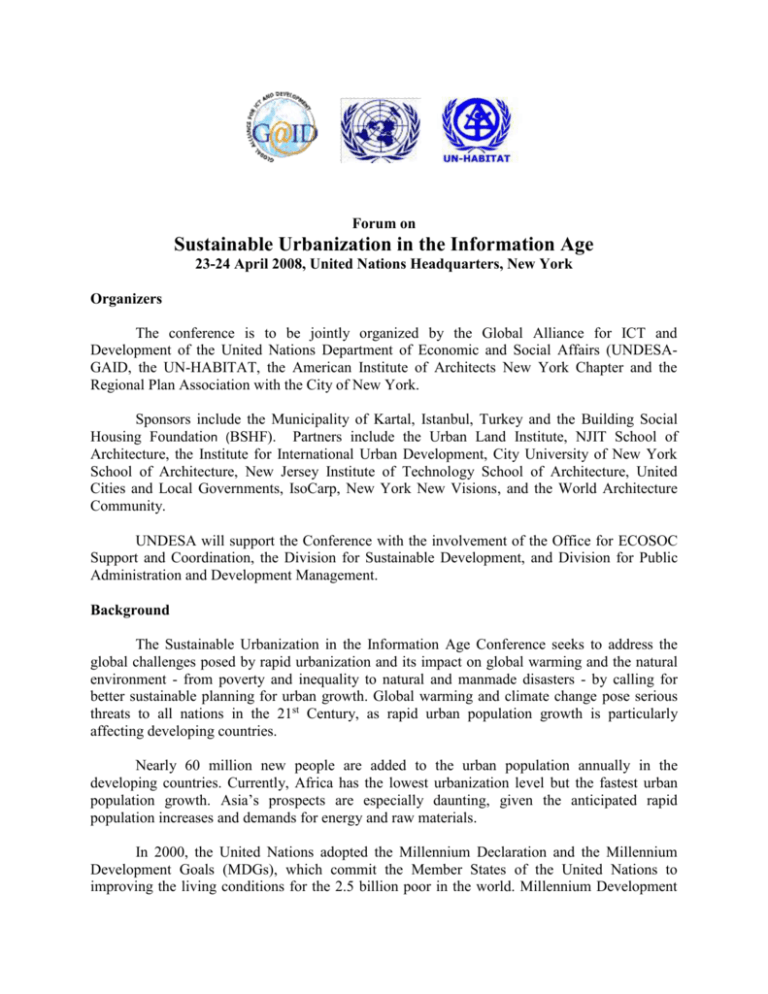
Forum on Sustainable Urbanization in the Information Age 23-24 April 2008, United Nations Headquarters, New York Organizers The conference is to be jointly organized by the Global Alliance for ICT and Development of the United Nations Department of Economic and Social Affairs (UNDESAGAID, the UN-HABITAT, the American Institute of Architects New York Chapter and the Regional Plan Association with the City of New York. Sponsors include the Municipality of Kartal, Istanbul, Turkey and the Building Social Housing Foundation (BSHF). Partners include the Urban Land Institute, NJIT School of Architecture, the Institute for International Urban Development, City University of New York School of Architecture, New Jersey Institute of Technology School of Architecture, United Cities and Local Governments, IsoCarp, New York New Visions, and the World Architecture Community. UNDESA will support the Conference with the involvement of the Office for ECOSOC Support and Coordination, the Division for Sustainable Development, and Division for Public Administration and Development Management. Background The Sustainable Urbanization in the Information Age Conference seeks to address the global challenges posed by rapid urbanization and its impact on global warming and the natural environment - from poverty and inequality to natural and manmade disasters - by calling for better sustainable planning for urban growth. Global warming and climate change pose serious threats to all nations in the 21st Century, as rapid urban population growth is particularly affecting developing countries. Nearly 60 million new people are added to the urban population annually in the developing countries. Currently, Africa has the lowest urbanization level but the fastest urban population growth. Asia’s prospects are especially daunting, given the anticipated rapid population increases and demands for energy and raw materials. In 2000, the United Nations adopted the Millennium Declaration and the Millennium Development Goals (MDGs), which commit the Member States of the United Nations to improving the living conditions for the 2.5 billion poor in the world. Millennium Development As of 24 March 2008 2 Goal 7 aims to ensure environmental sustainability by integrating the principles of sustainable development into Member States’ policies and programmes. Sustainable urban design and architecture are key considerations in environmental planning and management that seek to improve living conditions while preventing inequity and exclusion. However, even in developed countries, such sustainable approaches are new. The development of appropriate ideas, methods and clean energy technologies needs to be tested and applied. No global panaceas exist but many approaches can be productively adapted from one location to another. The Sustainable Urbanization in the Information Age conference seeks to create opportunities to share best practices between nations, as well as the political means to bring about change. It is imperative that the problem of worldwide urbanization be faced in an informed and inspired way, in order to create the preconditions for a sustainable environment and healthy and fulfilling life for millions of people around the world. The Conference will be held in New York City during Earth Week on 23 April 2008, at the United Nations Headquarters and on 24 April 2008 at the Centre for Architecture (by invitation only), a public forum for architecture and urban design. The conference will be linked to other events planned in New York on the celebration of Earth Day (22 April) and Earth Week - the anniversary of Mayor Bloomberg’s PlaNYC 2030, as well as the 2008 Regional Assembly of the Regional Planning Association on “Oil and Water, Adopting to Society” to be held on 18 April 2008, and the Go Green Expo on 27-27 April 2008. The World Urban Forum organized by UN-HABITAT, which will take place in China in October 2008, will concentrate on the sustainability of cities. Objectives The conference goals are as follows: (i) (ii) (iii) (iv) bring together mayors and representatives of global cities, who show or have the potential to show leadership in sustainable urban planning, to talk about their challenges for sustainable growth and renewal by 2030; produce practical solutions, share best practices in achieving sustainable design in urban areas in the world and discuss deliverables for planning for smart growth; share knowledge to bridge the digital divide in the area of sustainable urban design and planning, as well as innovative ICT models for sustainable urban planning; and elucidate the political means by which sustainable development and protection of the natural environment is possible. The conference will invite representatives of Member States, local authorities, policy makers, developers, architects, engineers, planners, designers, members of civil society, media, ICT experts, and the private sector to engage in a policy dialogue, with the aim of establishing a sustainable environment worldwide. 2 As of 24 March 2008 3 Outcomes The outcomes of the conference will be the following: analyze the approach of cities from all over the world in their dealings to address sustainable urban development; demonstrate best practices and lessons learnt from these cities; create awareness on the role of ICT in the area of sustainable architecture and urban planning in a globalizing world; increase involvement in Millennium Declaration values and respect for nature and the Millennium Development Goal 7; encourage dialogue among representatives of different countries, regions, professions and those who have different expertise in the areas of policymaking, architecture, urban planning, engineering and transportation; and establish new relationships between those involved in ICT, sustainable architecture, urban planning and design. Audience The conference will bring together a multitude of international and local stakeholders responsible for policy making and city planning for dialogue around the challenges climate change poses to sustainable urbanization. The objective of the conference is to look at practical political approaches with which to foster sustainable development in urban areas. The information resulting from this meeting will be published in a book form. This book will be distributed a United Nations publication. The communications surrounding the event will include a blog and a wiki on the UNDESA-GAID website, which will distribute information on the meeting. The conference will take full advantage of available information and Communication technologies, allowing the public to listen in and contribute their opinions and ideas simultaneously and virtually. Forum discussions will be webcast live on the internet and included in interactive chat rooms. A blog and website will be set up to feature background information and guide questions, stimulating discussions around the themes of the meeting. 3
